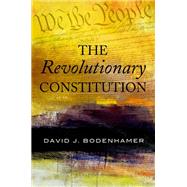The Revolutionary Constitution
, by Bodenhamer, David J.- ISBN: 9780199360444 | 0199360448
- Cover: Paperback
- Copyright: 11/29/2013
The framers of the Constitution chose their words carefully when they wrote of a more perfect union--not absolutely perfect, but with room for improvement. Indeed, we no longer operate under the same Constitution as that ratified in 1788, or even the one completed by the Bill of Rights in 1791--because we are no longer the same nation.
In The Revolutionary Constitution, David J. Bodenhamer provides a comprehensive new look at America's basic law, integrating the latest legal scholarship with historical context to highlight how it has evolved over time. The Constitution, he notes, was the product of the first modern revolution, and revolutions are, by definition, moments when the past shifts toward an unfamiliar future, one radically different from what was foreseen only a brief time earlier. In seeking to balance power and liberty, the framers established a structure that would allow future generations to continually readjust the scale. Bodenhamer explores this dynamic through seven major constitutional themes: federalism, balance of powers, property, representation, equality, rights, and security. With each, he takes a historical approach, following their changes over time. For example, the framers wrote multiple protections for property rights into the Constitution in response to actions by state governments after the Revolution. But twentieth-century courts--and Congress--redefined property rights through measures such as zoning and the designation of historical landmarks (diminishing their commercial value) in response to the needs of a modern economy. The framers anticipated just such a future reworking of their own compromises between liberty and power.
With up-to-the-minute legal expertise and a broad grasp of the social and political context, this book is a tour de force of Constitutional history and analysis.
In The Revolutionary Constitution, David J. Bodenhamer provides a comprehensive new look at America's basic law, integrating the latest legal scholarship with historical context to highlight how it has evolved over time. The Constitution, he notes, was the product of the first modern revolution, and revolutions are, by definition, moments when the past shifts toward an unfamiliar future, one radically different from what was foreseen only a brief time earlier. In seeking to balance power and liberty, the framers established a structure that would allow future generations to continually readjust the scale. Bodenhamer explores this dynamic through seven major constitutional themes: federalism, balance of powers, property, representation, equality, rights, and security. With each, he takes a historical approach, following their changes over time. For example, the framers wrote multiple protections for property rights into the Constitution in response to actions by state governments after the Revolution. But twentieth-century courts--and Congress--redefined property rights through measures such as zoning and the designation of historical landmarks (diminishing their commercial value) in response to the needs of a modern economy. The framers anticipated just such a future reworking of their own compromises between liberty and power.
With up-to-the-minute legal expertise and a broad grasp of the social and political context, this book is a tour de force of Constitutional history and analysis.






